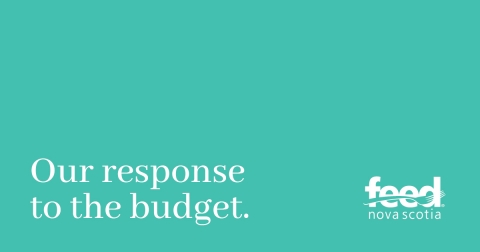Our response to the budget

The opening of Nova Scotia’s 2023-24 budget and its focus on healthy communities had us optimistic. The budget rightly asserted that ‘by addressing the factors affecting health and well-being, we can help improve the quality of life for all Nova Scotians’. Since we know that healthy communities require food secure communities, we expected to see investments in food security.
Our optimism quickly shifted to disappointment.
Despite its aim to foster healthy communities, the budget doesn't once mention 'food security' and it certainly doesn't meaningfully address the underlying factors behind food insecurity, such as income poverty, high cost of living, and unaffordable housing. As a province where 17.7% of citizens (or 1 in 6 households) are food insecure, that's a big miss.
In the first two months of this year, Feed Nova Scotia saw a 27% increase in year-over-year food bank visits. In February, we recorded the highest (1,278) daily average visits to food banks, a new record by a wide margin.
These exponentially rising numbers are by no means outliers; they've become a terrifying norm. Yet the budget has done little to allay our worries.
We're especially concerned to see zero increase in provincial Income Assistance rates, which is the main source of income for 42% of folks accessing support at food banks. Income support is one of the most assured and impactful ways to reduce food insecurity. Without at least indexing the existing Income Assistance rates to inflation, Nova Scotians experiencing food insecurity will see the real value of their dollars not only stay stagnant—but actually diminish—this year.
The small increase of about $200 a year for Nova Scotia Child Benefit would be a positive step forward if not for the fact that the amount is too small to have a substantial impact on child poverty, and the highest portion of food bank visitors is single adults without children, who won't benefit from even this slight increase.
There's no doubt that investing in Nova Scotia’s healthcare system is imperative. But the budget ignores the preventive measures that can avert the severe pressure on Nova Scotia’s healthcare system in the first place.
People who are food insecure are much more likely to experience chronic physical and mental health problems. And, on average, those who are severely food insecure incur twice as much in annual healthcare costs than those who are food secure. Clearly, an investment in food security is an investment in healthy communities. Why, then, was it left out of the budget? How much worse will food bank numbers have to get before food insecurity and its root causes get the attention they need?
Despite the disappointment, we continue to hope that Income Assistance rates will be raised and indexed to inflation in the immediate future. And we hope government will invest at a higher rate in non-market, non-profit, co-op, affordable housing for low-income Nova Scotians, and that they'll waive or reduce the deductible after the co-pay in the Family Pharmacare Program.
Leaving thousands of Nova Scotians to live a life of damaging poverty and food insecurity is a political choice. At Feed Nova Scotia, we'll continue to do our part in speaking out for better choices—ones that are necessary to reduce food insecurity and create healthy communities. And we encourage all Nova Scotians to do the same.